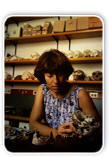| |
Prof. Patricia Smith, PhD
(Chicago) ; BDS. LDS (U. London)
Professor, Wilbush Chair in Medical
AnthropologyEmail
pat@cc.huji.ac.il
Voice mail 972-2-6758577, 6757608 |
 |
Main Research interests
a. Human origin
b. Past populations in the Southern
Levant:
c. Dental evolution
d. Dental ontogeny, development and
function
e. The origin and spread of genetic and
infectious diseases in the past



Dr. Marina Faerman, Ph.D.; Kamea
Fellow
Born 1953. Moscow, Russia; Ph. D. 1986,
Moscow State Univ.; Lect. 1994; Sen.
Lect. 1998, Laboratory of Biological
Anthropology and Ancient DNA.
Email:
marinaf@pob.huji.ac.il
Tel: 972-2-6757608; Fax: 972-2-6757451
Research Interests
Paleopathology; ancient DNA; population
genetics
Research Projects
 Evolution of ancient pathogens &
prevalence of infectious diseases in
ancient populations of the Near East &
Europe;
Evolution of ancient pathogens &
prevalence of infectious diseases in
ancient populations of the Near East &
Europe;
 Origin and spread of genetic disorders
in past populations of the Mediterranean
Basin;
Origin and spread of genetic disorders
in past populations of the Mediterranean
Basin;
 Genetics of past present populations in
Israel and the Middle East;
Genetics of past present populations in
Israel and the Middle East;
 Forensic and archaeological
applications.
Forensic and archaeological
applications.
Abstract of current research
Bioanthropology of past and present populations
of Israel, Middle East and Europe with
the main emphasis on population origins,
disease patterns and host-pathogen
relationships.
Keywords: Mitochondrial and
Y-chromosomal DNA variation; sex
identification and burial customs;
porotic hyperostosis and
hemoglobinopathies; tuberculosis.
Click here to go to Dr. Faerman's page
at bioanthropology.huji.ac.il



Dr. U. Zilberman, Ph.D., D.M.D. –
Research Associate
Associate researcher & Head of
Department of Pedodontics - Barzilai
Medical Center, Ashkelon.
Inventor and CSO of "Uri-dent ltd"- a
start-up company developing esthetic
crowns for primary dentition.
Research interests
 Developmental mechanism of tooth
development and the influence of
hereditary syndromes on tooth
development.
Developmental mechanism of tooth
development and the influence of
hereditary syndromes on tooth
development.
 Tooth components: development of enamel
and dentin in children with growth
disorders.
Tooth components: development of enamel
and dentin in children with growth
disorders.
 Development of new dental restorations
for pediatric dentistry- the first
product: esthetic crowns for primary
molars to replace the widely used
stainless-steel crowns.
Development of new dental restorations
for pediatric dentistry- the first
product: esthetic crowns for primary
molars to replace the widely used
stainless-steel crowns.




Netta Lev-Tov Chattah, MA
Tel-Aviv, 2001
Ph.D Student
Email:
netalev@md.huji.ac.il
Research Interests:
Dental anthropology: pathology,
development, function, odontometry and
trait analysis. Information gathered
from dental remains of protohistoric
populations is being used to reconstruct
dietary habits, food processing methods,
general health and biological
affiliations of these populations.
Current Research Projects
 Ph.D Dissertation: The Impact of
Socio-Economic and Political Factors on
Health Patterns and Dental Disease
during the Chalcolithic and Early Bronze
Age I in Israel.
Ph.D Dissertation: The Impact of
Socio-Economic and Political Factors on
Health Patterns and Dental Disease
during the Chalcolithic and Early Bronze
Age I in Israel.
Changes that occurred in Israel towards
the end of the first part of the Early
Bronze Age represent in many ways the
intensification of processes that had
begun in the previous Chalcolithic
period, notably surplus production and
trade, possibly associated with
colonialism by Egypt.
By comparing dental morphometry,
pathology, development, and function
between populations dated to both
periods, the study aims to answer the
following questions: Did population
movements into Israel occur during the
EBA I? In what way did the rise in
population, intensification of trade and
market level production, settlement in
large proto-urban sites and greater
socio-political complexity affect the
EBA I population in terms of health.
The study gives researchers an insight
into the long and short term effects of
changes in on health, and may also
provide some insight into the long
standing debates regarding the rise of
urbanism in Israel.
 Regional Variation in Dental Attrition
Rates of Chalcolithic Populations in
Israel.
Regional Variation in Dental Attrition
Rates of Chalcolithic Populations in
Israel.
 Analysis of dental findings from Shiqmim
Village.
Analysis of dental findings from Shiqmim
Village.
 Analysis of skeletal findings from
Hazerim.
Analysis of skeletal findings from
Hazerim.



Gal Avishai, DMD, MSc, Hebrew
University 2004
PhD student
Email:
gavishai@md.huji.ac.il
Research Interests
Focus on the use of teeth to study
development and evolution using imaging
techniques to quantify enamel and
dentin.
 Development: Pre-natal and post-natal
dental development, models for tracing
development using the morphology of
completed teeth and tooth germs of
normal and developmentally impaired
individuals.
Development: Pre-natal and post-natal
dental development, models for tracing
development using the morphology of
completed teeth and tooth germs of
normal and developmentally impaired
individuals.
 Evolution: The link between development
and evolution shown by variation in
morphogenesis
Evolution: The link between development
and evolution shown by variation in
morphogenesis
 Forensic Archeology: Use of dental
remains to assess age at death in past
populations.
Forensic Archeology: Use of dental
remains to assess age at death in past
populations.
 Imaging: Application of High resolution
computerized tomography
Imaging: Application of High resolution
computerized tomography



David Keinan, DMD, MSc



Yael Givol, BA



Yossi Natan, DMD

|
|





